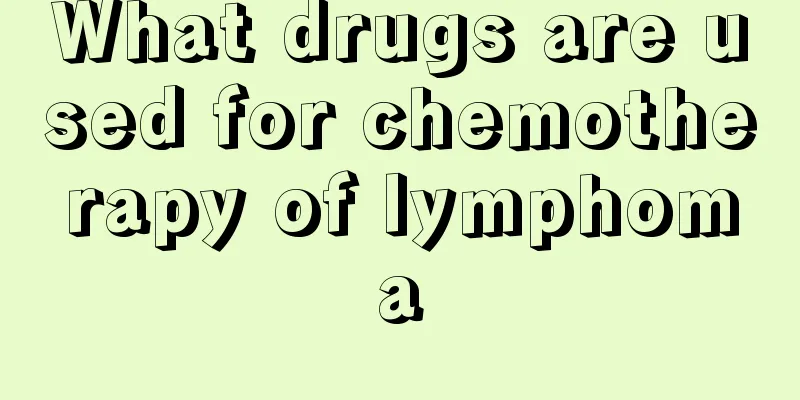What drugs are used for chemotherapy of lymphoma

|
Lymphoma is a relatively serious malignant tumor, and its harmfulness can be ranked in the top three, which is still quite serious. If you have lymphoma, you must go to the hospital for treatment, and the treatment will definitely use drugs. So what drugs are currently used in the clinical treatment of lymphoma? Patients will experience many side effects during the intermission period after chemotherapy. Adjuvant therapy is intended to improve these side effects: ① When the white blood cell count drops to a certain value, the patient needs white blood cell raising treatment and oral blood-enriching drugs. ② For nausea and vomiting after chemotherapy, patients need to take antiemetic drugs orally or intravenously, and the symptoms can be relieved in 3 to 5 days. ③ Patients with poor appetite need to take oral progesterone drugs to increase appetite. ④ Patients with constipation may add some laxatives. ⑤ For patients with severe reactions, Chinese medicine for strengthening the body and regulating qi can be used to help patients spend the chemotherapy interval more comfortably. In addition, patients should also pay attention to a light diet, drink plenty of water, and eat more vegetables and fruits with crude fiber, which will help patients with symptoms such as nausea, vomiting, and constipation. Eating more high-protein foods to enhance nutrition will also help the bone marrow hematopoietic function recover as soon as possible. When does the white blood cell count drop to a certain level before a patient needs to use white blood cell-raising drugs? What are the side effects of white blood cell-raising drugs? The decline in white blood cells is not terrible, but the concurrent infection is terrible. ① When the bone marrow toxicity reaches one degree and the white blood cell count is (3.0~3.9)*109/L, it is usually not treated. ② If the white blood cell count is between (2.0 and 2.9)*109/L and the patient has no fever or infection, he or she can be temporarily observed. ③If accompanied by fever or infection, anti-infection and platelet-raising treatment are required. ④When the white blood cell count is lower than 2.0*109/L, white blood cell-raising drugs are needed regardless of whether there is a fever or not. It should be noted that the timing of blood tests is very important. The 5th to 6th day after chemotherapy is the beginning of the decline in white blood cells. If the white blood cell count is around 2.0*109/L at this time, it needs to be treated immediately. If it is not treated, the white blood cell count will continue to decline and may become third or fourth degree bone marrow toxicity. 17th to 18th day after chemotherapy, if the white blood cell count is higher than 2.0*109/L, there is no need to treat it if there is no fever, because the white blood cell count is in the rising stage and can recover on its own. Some patients who use the white blood cell injection for the first time report that they will have severe bone pain symptoms after the injection, ranging from distending pain to unbearable stabbing pain. Such patients can take some antipyretic and analgesic drugs half an hour before the injection to relieve the side effects. What is the reason why the white blood cell count of patients cannot be increased after taking white blood cell-raising drugs? The reasons why the white blood cell count does not rise should be analyzed specifically: ① Some elderly people have poor bone marrow hematopoietic function, which becomes worse after multiple chemotherapy, and it is difficult for white blood cells to increase quickly. ② Some patients have received chemotherapy that affects hematopoietic bones, such as pelvic radiotherapy, and their white blood cell count may not rise. ③ Long-term use of bone marrow toxic drugs inhibits hematopoietic function and makes it difficult for white blood cells to increase. ④ The patient has poor eating habits and poor nutrition absorption, and the white blood cell count will not rise quickly. Therefore, individual analysis should be conducted based on the patient's condition. Will the long-term inability to increase white blood cells affect the effectiveness of chemotherapy? If the white blood cell count does not rise for a long time, it will invisibly prolong the chemotherapy cycle and the interval between chemotherapy. Extending the chemotherapy interval for a few days will have no effect, but missing two to three weeks may affect the therapeutic effect of chemotherapy. Once this happens, you need to consult a specialist. |
<<: What are the treatments for lymphoma
>>: Is exercise beneficial to patients with lymphoma?
Recommend
What should you pay attention to in your diet for bladder cancer?
Bladder cancer ranks eighth among the top ten mal...
Suspect that I have rabies_Feel that I have rabies
Rabies may not seem serious, but it can actually ...
Painful urination and low urine volume
Under normal circumstances, people will not exper...
Two-month-old baby's poop has blood streaks, sometimes good and sometimes bad
We all know that for two-month-old babies, their ...
How about the salt water detox method
As people pay more attention to health-preserving...
Six easy and effective ways to prevent pancreatic cancer
Pancreatic cancer causes great harm to the patien...
What are the hazards of ascites in ovarian cancer
Women should receive treatment as soon as possibl...
Does smoking and drinking have an impact on prostate cancer?
When caring for prostate cancer patients, the fir...
What does a mole on the corner of the eye mean
It is said that people with moles at the corners ...
Will blood pressure rise after taking a bath
Blood pressure will not rise after taking a showe...
What to do if your hair is very long
Sweat hair is the hair that grows on our body. So...
Four tips to identify the quality of chrysanthemum tea
There are many kinds of chrysanthemum tea on the ...
Drugs for treating advanced kidney cancer
Kidney cancer is a common malignant tumor. In rec...
What are the methods for jejunal nutrition tube implantation
There are many diseases that require patients to ...
Drugs that can control the growth of lymphoma
Lymphoma has different stages. It is also one of ...









